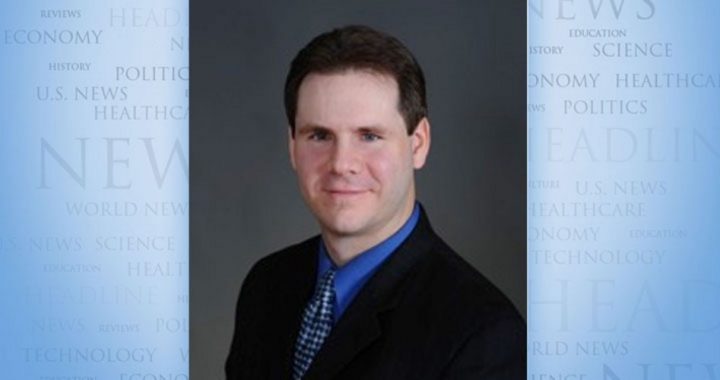
“You’re a fascist!” “You’re a racist, sexist, bigoted homophobe!”
Media bias often leads to the thoughtless hurling of names, but reporters can’t help but exhibit a negative bias when they don’t know what the names mean in the first place. A good example is the reportage on Europe’s burgeoning anti-Islamization movements, such as the German-born Patriotic Europeans Against the Islamization of the West (PEGIDA) and Marine Le Pen’s National Front Party in France. And a good example of this good example is a Reuters article by one Jacob Heilbrunn entitled “Charlie Hebdo fallout: Specter of fascist past haunts European nationalism.” And what haunts all of us is the decline in Western education.
We can start with Heilbrunn’s description of Le Pen’s agenda, in which he says she “espouses an authoritarian program that calls for a moratorium on immigration, a restoration of the death penalty and a ‘French first’ policy on welfare benefits and employment.” Authoritarian? Given the term’s definition, “favoring complete obedience or subjection to authority as opposed to individual freedom,” do the aforementioned policy changes qualify? Heilbrunn seems to be defining authoritarian as “contrary to the leftist agenda.”
More interesting, however, is the common misunderstanding of the term “fascism.” After stating, “whether Le Pen’s stances — and those of other nationalist leaders in Europe — qualify as fascist is questionable” (leading readers to believe they’re getting unbiased analysis), Heilbrunn alludes to the confusion around the word, writing, “Scholars continue to debate whether Mussolini was even fascist — or simply an opportunistic nationalist.” The idea is that, contrasting the Italian leader with Hitler, Mussolini might not have been the true fascist Hitler was. Implied here is that Hitler was the default standard.
This is a little funny considering that fascism was born in Italy while Hitler was an obscure 20-something corporal fighting in WWI — and that Mussolini was one of its founding fathers. And the term’s etymology evidences this pedigree: “Fascism” comes from the Italian words fascio (“group, association”) and fasci (“groups of men organized for political purposes”), and the Fascist Party’s symbol was the fasces, a “bundle of rods containing an axe with the blade projecting” that symbolized power and was carried before a Roman magistrate. In other words, these “scholars’” debate over Mussolini is a bit like contrasting English and American English and then wondering if the English really speak English.
Heilbrunn makes another common mistake, writing of “the outright fascism of the 1920s and 1930s, when Adolf Hitler and Benito Mussolini espoused doctrines of racial superiority.”
Mussolini did not espouse doctrines of racial superiority in the ’20s and not for at least most of the ’30s, either.
True fascism never had a racial agenda.
This is hard to accept because it runs so counter to stereotypes and established narratives. But fascism emphasized national unity and thus rejected divisive principles such as communism’s class warfare ideology — and unity-destroying racialism. In fact, Mussolini said himself, “National pride has no need of the delirium of race.” This is why, when he finally instituted some anti-Semitic laws at Hitler’s behest towards the end of his regime, many of his co-ideologists called them “un-fascist.”
So what is fascism? Ideology founder Mussolini summed it up simply, “All within the state, nothing outside the state, nothing against the state.” This is a true authoritarian sentiment, and it answers Heilbrunn’s question: Since none of the new patriotic European movements espouses anything approximating Mussolini’s formulation, it’s a bit fanciful to label them “fascist.” In fact, it is the liberty-quashing European Union, which they oppose, that better fits that description.
Of course, it is true that these European movements are nationalistic. But saying this makes them fascist is a bit like claiming that Heilbrunn is a Nazi because, like the Nazis, he wears clothes.
While the Italian fascists were nationalistic, so are the Marxist North Koreans, and the Chinese were, too — even when they actually were Maoists and not just the vulture-capitalist pretenders they are today. The point is that it is internationalism, not nationalism, that is abnormal. The nation is an extension of the tribe, which itself is an extension of the family; thus, nationalism is simply an extension tribalism, which itself is an extension of family patriotism. This tells us something, by the way: The absence of nationalism indicates the absence of a nation just as the absence of tribalism indicates the absence of a tribe, and the absence of family patriotism indicates the absence of a family — in the true sense of the word. Remember that when family members’ bond dissolves and they care for each other no more than for a stranger (and maybe less), we tend to say the family has “broken up,” and a person thoroughly alienated from his kin may say, “I have no family.”
This brings us to the people who have no nation. The media treat this normal phenomenon of nationalism as if it’s unusual, but only when it’s exhibited by Westerners. This is for two reasons, the first being typical leftist prejudice. “Oppressors” (Westerners) have no right to national family patriotism or self-interest, but the “oppressed” (everyone else) are held to a different standard. Second, since most in the media are internationalists — citizens of the world and philanderers of nations — it is unusual to them. They often manifest the common human mistake of mirroring, which is when you ascribe your own motivations, feelings, priorities, and values to others, assuming yours represent the norm. A “sophisticated” Western person doesn’t entertain anything as primitive as patriotism, you see.
Yet media moderns aren’t sophisticated enough to know what is relative and what isn’t. To wit: Heilbrunn describes Le Pen and other nationalists as “far-right,” ignoring that position is a relative thing. If when describing location I say I’m to the right or left, the obvious question is “Of what?” It’s no different politically speaking, as all our common terminology is provisional.
The terms “right” and “left” originated with the French Revolution, with a rightist wanting to preserve the monarchy and a leftist endeavoring to create a republic (so leftists were small-r republicans). And the only consistent definition of the political term “right” reflects this desire to maintain the status quo. This is why rightists have very different ideology depending on time and place, being monarchists in 1789 France, communists in the Soviet Union, and anti-communists in the United States.
So, again, “right” relative to what? Answer: the political center — which is determined by the consensus beliefs of the people. And as that center shifts ideologically over time, so do “right” and “left.” This means that since Le Pen’s National Front is currently the most popular party in France, it now reflects the center more than the right. All that has changed is that either the people’s true beliefs are coming to the fore, thus revealing the true center, or, again, that center has shifted.
Of course, this will be hard for solipsistic leftists, who instinctively feel they define the center, to accept. But if you don’t want our political terminology to shift with the sands of politics, you need to find absolute terms to describe our politics (“stinks” comes to mind).
While I’ve been picking on Jacob Heilbrunn, know that he’s merely one of a thousand points of intellectual lightness in the media. And that is what’s so tragic: How can the electorate be informed when the purveyors of information are uninformed themselves?



